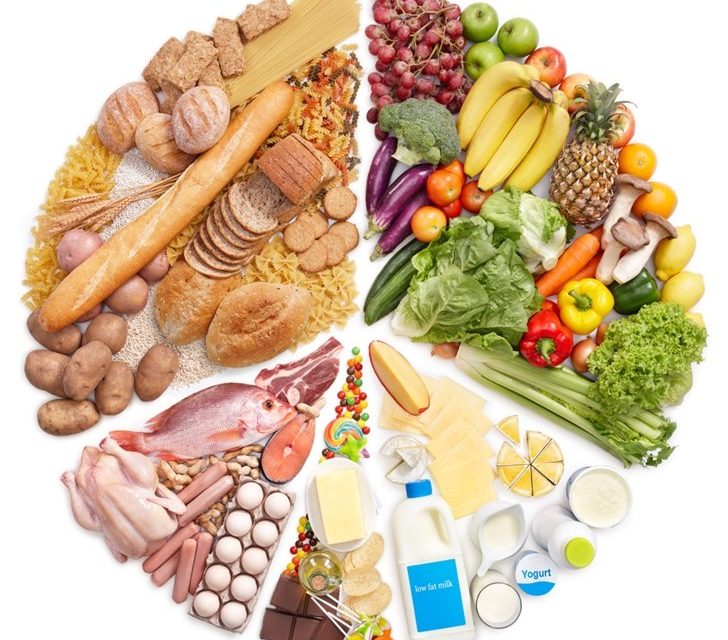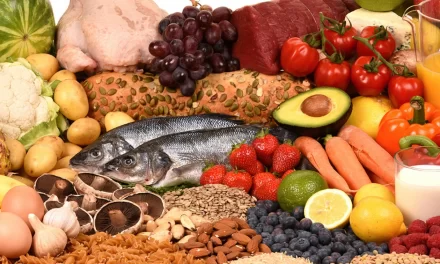With all the contradicting dietary recommendations, you often don’t even know what to eat. Now the German Nutrition Society has updated its recommendations for healthy eating – and deleted old recommendations altogether.
The German Nutrition Society (DGE) has been recommending Germans what and how much to eat since 1956. Now the association from Bonn has reformulated its ten rules for a healthy diet.
Healthy nutrition means: Enjoying a variety of foods!
The top priority of a healthy diet is eating a variety of foods and consuming mainly plant-based foods. The more varied the diet, the healthier it is and the lower the risk of deficiency symptoms.
The following applies to vegetables and fruit: five servings a day.
The DGE has now also given more precise information on fruit and vegetables: every German who wants to ensure a healthy diet should consume at least three servings of vegetables and two servings of fruit a day. Legumes such as lentils, peas and beans are also explicitly mentioned because of their healthy dietary fibre.
Whole grains are the best choice for cereal products.
In the current recommendations, the DGE recommends always choosing the whole grain variant for cereal products. These would fill you up longer and contain more nutrients than white flour products. Whole grain products also reduced the risk of “Type 2 diabetes mellitus, lipid metabolism disorders, colon cancer and cardiovascular diseases”, according to the German Nutrition Society.
However, the advice to consume plenty of carbohydrates in cereal products and potatoes has been deleted. Experts have long criticized that such a diet makes it difficult to lose weight and promotes diabetes.
Eat fish & meat in moderation.
Dairy products should still be eaten daily for food of animal origin, but fish only once or twice a week. For meat, the DGE continues to recommend eating it in moderation as part of a healthy diet – no more than 300 to 600 grams per week.
Dr. Viola Andresen
interview
Medicine How our intestines stay healthy
For a long time, our digestive tract was criminally underestimated. In the meantime, however, medical professionals are sure that the intestine has a significant influence on our immune system and even our psyche. The specialist Viola Andresen explains how we can best keep this vital organ healthy.
Vegetable fats instead of low-fat foods
The DGE recommends using vegetable oils when cooking or as a spreadable fat. These provide essential omega-3 fatty acids and vitamin E. “Hidden fats” in processed foods, on the other hand, should be avoided as far as possible.
However, the advice to eat as little fat as possible and choose foods low in cholesterol has been removed from the ten recommendations. The DGE thus agreed with the critics that the cholesterol ingested has only an insignificant effect on the cholesterol level in the body and that fat is also essential for the body because of the healthy, unsaturated fatty acids.
Consumers in Germany get a wide range of high-quality food. Eating healthy is a pleasure – and a balanced diet is the best recipe for good health. The Federal Ministry of Food and Agriculture (BMEL) pursues a holistic policy for healthy eating.
The healthy choice should become an easy choice – in everyday life and the various phases of life from pregnancy and toddlerhood, daycare and school, leisure and work through to old age. That is why the BMEL advocates the reduction of sugar, salt and fats in finished products.
With the IN FORM initiative, the Federal Ministry of Food and Agriculture promotes a healthy lifestyle. INFORM bundles projects for a healthy lifestyle nationwide and offers information about healthy nutrition for all areas of life, from pregnancy to old age. During the breaks in everyday working life, food is used as a means of strength, in schools as a means of learning, and after exercise to build up.
The influence of diet on health
Diet – together with sporting activity, sunlight, and balanced mental life – probably has the most significant influence on our well-being, fitness, and health.
While sport is not for everyone and the psyche often goes its way, the diet can be adjusted without great effort and change quickly and with apparent success.
No, we haven’t forgotten the genes. It’s just that the genes – even if they were responsible for this or that disease – only become active when the diet is neglected, the organism, as a result, suffers from a lack of vital substances, the immune system is ultimately weakened, and thus the suitable breeding ground for Illness and suffering is created.
The diet with the wrong foods
Most of us are used to buying groceries for our diet from supermarkets or fast food outlets.
We do this from childhood, and therefore this type of food procurement is typical for us, but it made us forget which foods are good and healthy.
And so, the majority of all food in the shops and restaurants does not in any way fit into a healthy diet.
It is a colourful assortment of highly industrially processed products and mostly canned foods that can be kept for months or at least weeks.
An infinite variety of chemical food additives and creative technological processes ensure a perfect appearance at all times, and thus the saleability of the things declared as food.
The point of healthy eating
But the point of nutrition is not only to be satisfied with the help of any mass as quickly as possible, but often only for a short time and not infrequently at the price of discomfort and digestive problems, but to stay healthy, happy vital.
The temporary satiety value of a dish may be significant in times of need. However, if we do not live in war or other crises, we should choose our foods based on their vital substance content.
Whether we get sick or stay healthy depends, among other things, on our eating behaviour. Obesity and cardiovascular diseases, for example, are favoured by an unhealthy diet – but also some cancers. But which food components make us sick? And which ones protect us? Nutritional research provides insights into health recommendations and develops new foods that can help us stay healthy.
The scientists of the “Allipids” project make healthy things palatable to us: Together with their industrial partners, they made an emulsion from oils that contains many omega-3 fatty acids. The oils lose their slightly fishy taste and have a longer shelf life. With this emulsion in cooperation with food manufacturers, the researchers enrich common foods – bread rolls, sausage, dairy products and spreads.
However, we often find it difficult to follow these recommendations. Where does this appetite for greasy and sweet things come from? Or, to put it another way: How do we get better nutrition recommendations, and what helps us implement them? Modern nutritional research also deals with questions like these because health awareness is one of many motives influencing our diet.
Do you use fast food more often in stressful phases? Or are you one of the 40 percent or so of the population who eats less in these situations? Then it is essential to create a balance. The scientists of the EATMOTIVE research project were able to show: In favourable situations, healthy people unconsciously compensate for their eating behaviour – and eat less or more than before under stress.
Nutritional research works closely with other areas of science – with medicine, genetics, prevention research and psychology, for example. Because answers to the critical questions about our eating habits can only be found through joint interdisciplinary efforts. The Federal Ministry of Education and Research (BMBF) supports the scientists in this.
Research for a healthy life
Prevention and nutrition research is one of the six principal fields of action in the BMBF’s health research framework. The associated action plan defines this field. A central component is the “Competence Cluster Nutrition Research” measure. Within these four clusters, universities and other research institutions work closely with small and medium-sized companies in the food industry. Together they develop new recommendations and products for a healthier diet.
The BMBF also funds individual research institutions, for example, the German Institute for Nutrition Research (DIfE). Scientists search for the molecular causes of diet-related diseases to develop specific dietary recommendations and new prevention and therapy strategies. The Defi also plays a crucial role in one of the competence clusters.
The BMBF is involved in the joint program planning initiative “A healthy diet for a healthy life” at the European level. With the help of this initiative, the partner countries want to maintain people’s health and work together to counteract an increase in diet-related chronic diseases.





